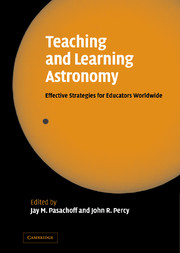Book contents
- Frontmatter
- Contents
- List of illustrations
- Preface
- Introduction
- Part I Astronomy in the curriculum around the world
- Part II Astronomy education research
- Part III Educating students
- Part IV Educating teachers
- Part V Astronomy and pseudoscience
- Introduction
- 12 Astronomy, pseudoscience and rational thinking
- 13 Astronomical pseudosciences in North America
- Part VI Astronomy and culture
- Part VII Astronomy in developing countries
- Part VIII Public outreach in astronomy
- Part IX The education programs of the International Astronomical Union
- Part X Conclusions
- Author index
- Subject index
13 - Astronomical pseudosciences in North America
Published online by Cambridge University Press: 18 May 2010
- Frontmatter
- Contents
- List of illustrations
- Preface
- Introduction
- Part I Astronomy in the curriculum around the world
- Part II Astronomy education research
- Part III Educating students
- Part IV Educating teachers
- Part V Astronomy and pseudoscience
- Introduction
- 12 Astronomy, pseudoscience and rational thinking
- 13 Astronomical pseudosciences in North America
- Part VI Astronomy and culture
- Part VII Astronomy in developing countries
- Part VIII Public outreach in astronomy
- Part IX The education programs of the International Astronomical Union
- Part X Conclusions
- Author index
- Subject index
Summary
Abstract: We briefly comment on three astronomical pseudosciences - astrology, creationism, and space aliens - which are accepted in North America by a significant fraction of the population. We list articles, books, websites, and organizations that provide useful resources which teachers, students, and the public can use to deal with such beliefs.
Pseudoscience
Pseudosciences are widely accepted in India, as Jayant Narlikar has explained in the previous chapter. Pseudosciences are also widespread in other populous countries that are not part of the “first world.” But pseudosciences also became very popular in countries such as Russia after the breakup of the Soviet Union. Science education was generally considered strong in these countries. Perhaps the coming of “democracy” encourages people to believe what they want (or for their beliefs to become more open). In North America, several forms of astronomical pseudosciences are widely accepted. Fortunately, there are individuals such as Andrew Fraknoi, and organizations such as the Astronomical Society of the Pacific (with which Fraknoi is associated), which have produced some excellent resource material for teachers and the general public; these are online at: http://www.astrosociety.org/education/resources/pseudobib.html
The Committee for the Scientific Investigation of Claims of the Paranormal (CSICOP), based in Buffalo, New York, and with a website at http://www.csicop.org, describes itself as follows: “CSICOP encourages the critical investigation of paranormal and fringe-science claims from a responsible, scientific point of view and disseminates factual information about the results of such inquiries to the scientific community and the public.” They publish a valuable magazine, Skeptical Inquirer, six times a year. An index of past articles is on line at their website.
- Type
- Chapter
- Information
- Teaching and Learning AstronomyEffective Strategies for Educators Worldwide, pp. 172 - 176Publisher: Cambridge University PressPrint publication year: 2005
- 1
- Cited by



